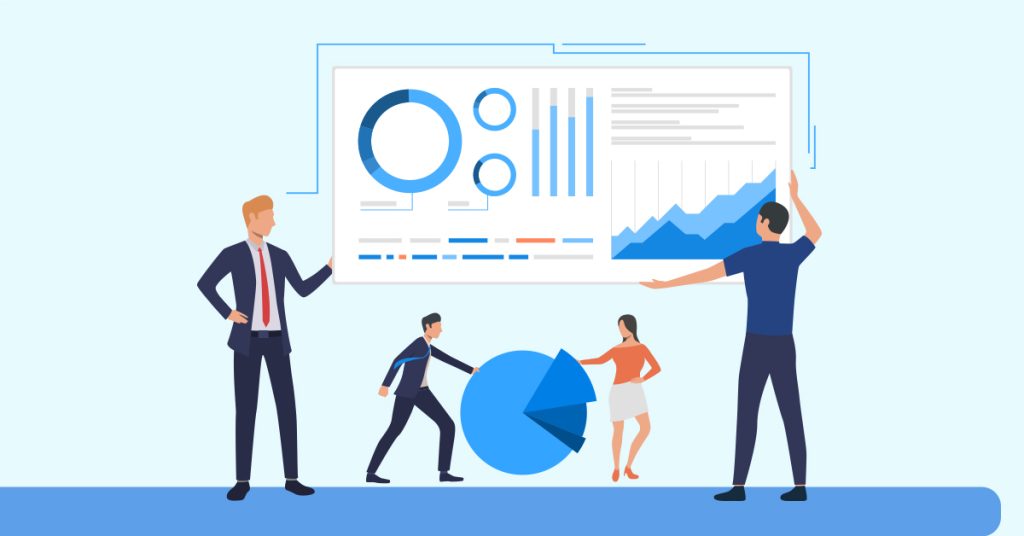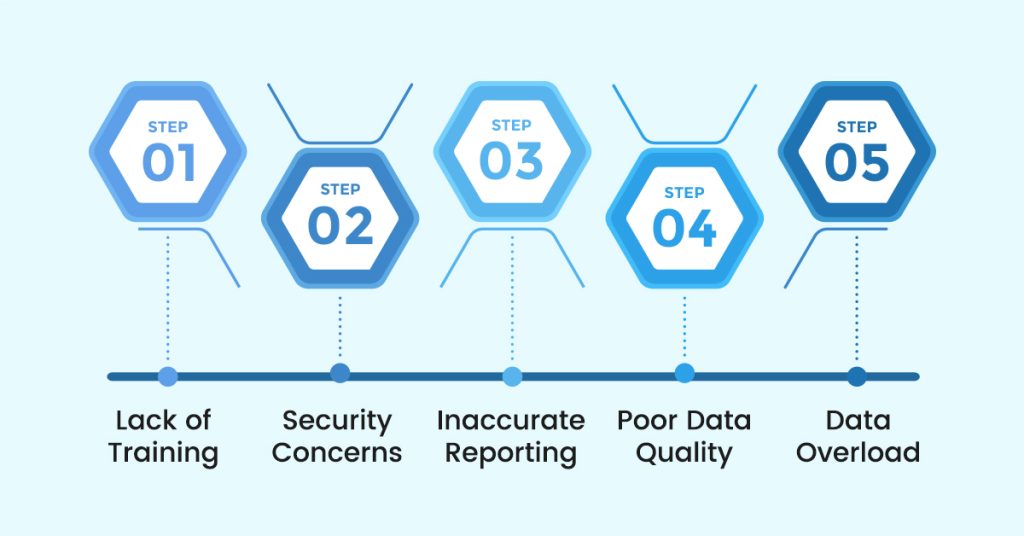Quick Summary
Expand the knowledge about data analytics for finance industry to boost the financial operations. This blog state key benefits and challenges of data analytics in finance industry that helps in ensuring streamlined workflow. We will also explore future trends that helps in expanding finance industry.
Data Analytics is one of the fastest-growing sectors in the finance industry. According to the Bureau of Labor Statistics, employment in this sector was expected to grow 11% between 2016 and 2026. Jobs in this field are also among the highest paying in the U.S., with an average salary of $127,000 annually.
Data analytics is the broad term for using data to gain insights into human behavior. It can be used in various industries, but finance is one of the biggest areas where it has been most effective. The finance industry relies heavily on numbers and data, but it also needs to understand how people behave to make sure they are making good decisions with their money.
The use of data analytics in the financial sector has allowed companies to understand better the markets they serve and help them meet the needs of their customers and clients. Here are some ways that data analytics has changed the finance industry.
What Is Data Analytics?

Data analytics is the process of extracting meaning from data. It is a powerful tool that you can use to make informed decisions about your business. It can include analyzing trends, patterns, and anomalies to predict future events.
It can be used in nearly every industry, from healthcare, finance to manufacturing. However, it is essential for those in technology as it provides the insights needed to unlock the value of big data. It can improve marketing efforts, increase sales and boost customer loyalty. Also, it can help you better understand your company’s financial performance.
4 Major Benefits of Data Analytics in Finance
Data analytics is a powerful tool that can be used to gain a competitive advantage. While the benefits are plentiful, here are four significant benefits of data analytics in finance:
1. Predictive Analysis
Data analytics can help predict future events based on past trends. This can be useful for companies making market predictions, such as insurance companies or those that need to forecast their sales and profits. For example, an insurance company can predict which customers are most likely to file claims in the future.
By identifying these customers early on, the company can offer incentives for safe driving behavior or refer them to wellness programs if they do not qualify for discounts.
2. Increased Customer Retention
The most significant benefit of data analysis is that it can help you improve your customer retention rate and increase your profits. When you have more information about your customers and their needs, you can better decide what products to offer them and at what price to sell them.
This means that while other companies may offer similar products, you can offer yours at a lower price because it’s more tailored to their needs and interests.
3. Improved Operational Efficiency
Businesses today are under pressure to deliver better and faster results. It can help you make more informed decisions and improve business outcomes.
For example, if you want to optimize your marketing spend, data analytics services can help you determine which channels are most effective at driving revenue. This way, you can focus on those channels first and spend more time on what works best. It also allows you to identify your data’s trends, patterns, and correlations and use them to improve your operation.
4. Increased sales
One of the most common reasons for using data analytics in finance is to drive sales. By analyzing customer behavior, you can understand what products or services they will likely buy. You can also target these customers with advertising campaigns and promotions based on their preferences.
Challenges In Implementing Data Analytics

The key to success in business is to be ahead of the curve and stay ahead of the game. You need to use data analytics to stay on top of your game. Data analytics benefits businesses and individuals as it can help them make better decisions and reach their goals faster and easier.
Here are some of the common challenges that organizations face when implementing data analytics:
1. Lack of Training
Most companies need to gain knowledge of how to use data analytics as well as how to implement it into their business strategies. This is why they need proper training from experts who can help them understand what tools they should use and how best to use them within their organization. This will help companies increase their productivity and reduce costs by ensuring all employees use the right tools for the job.
2. Security Concerns
The Monte Carlo approach is one of the most used techniques. It is used to check the influence of unknown factors on a given output variable. This makes it perfect for risk assessments. The Monte Carlo technique is another name for Monte Carlo simulation. It is a process used in computer science to build models of potential outcomes. It functions as a related probability distribution as well. It assesses potential results and then calculates the probability that each will materialize. Data analysts use the Monte Carlo method to do sophisticated risk assessments. They can better forecast future occurrences and make well-informed judgments as a result.
3. Inaccurate Reporting
Another major challenge is inaccurate reporting. When a company collects its data and stores it in a database, there are many opportunities for errors. These errors can lead to incorrect reporting, which can be very costly for your business. The problem is that most companies still need to implement a system for monitoring their data quality. Thus, they may only know about problems once it is too late.
4. Poor Data Quality
Another challenge that most companies face is the poor data quality. A recent Forbes article noted, “The biggest challenge for companies is that they do not have good data quality. They have poor data quality because they have bad processes and too much manual intervention.”
The finance industry has many different data sources, each with its own problems. For example, a company may use multiple accounting, insurance, and human resources systems. This means that data coming from these systems will be different.
5. Data Overload
One of the main challenges in implementing data analytics is data overload. Companies have so much data that it becomes difficult to collect and analyze it meaningfully. This can also be referred to as the “big data” challenge.
For example, if you look at an average bank, they will have millions of customers who trade billions of dollars a year. That is a lot of information! Banks need to be able to analyze this information and use it to make better decisions about where they want to invest their money and how they want to manage their client’s accounts.
For banks to do this kind of analysis, they need software that can handle large amounts of data quickly and efficiently.
4 Future Trends and Outlook In Finance Industry
The finance industry is going through a massive transformation. The global financial crisis of 2007-08 and the subsequent recession have changed the way we do business. Here are four key trends that will shape the future of finance:
1. Rise of Digital Finance
The rise of digital finance has been one of the most significant developments in the industry over the past decade. It has also changed how consumers interact with banks and other financial institutions. The growth of mobile payments, for example, has been fuelled by innovations such as Apple Pay and Android Pay. These platforms allow users to make payments using their smartphones or wearables.
2. Digitization of Human Capital
In this age of technology, people are turning to online sources for information and knowledge. Therefore, human capital needs to be digitized so that it has access to all tools required for work purposes. This can only be achieved by providing employees with access to technology-based tools such as tablets or smartphones in order for them to accomplish their tasks effectively and efficiently.
3. Rise of Artificial Intelligence
Many firms are using AI to automate processes so as to free up human resources for other tasks. For example, banks can use AI to make loan decisions faster than ever while improving their credit scoring models. AI can also be used to detect fraud or identify potential customers that are likely to default on payments. Many startups have already used AI algorithms to develop their products and services.
4. Rise of Blockchain
The rise of blockchain has been one of the biggest trends in finance over the past few years.
While it was first used as a digital currency, blockchain technology is now being applied to healthcare and agriculture industries.
Blockchain has been touted as a game changer for many industries, but what exactly is it? Blockchain is a decentralized ledger that stores information in “blocks” and records transactions between two parties. The blocks are then linked into a chain that cannot be altered or deleted once written. This makes it easy to verify transactions and prevent fraud.
Conclusion
Data analytics is now a part of finance and will continue to provide solutions that help businesses improve. The important thing for any business to understand is that when you seek the advice of an analyst or agency, you need to be aware of your goals. Then, the focus must be on ensuring these goals are met and a reasonable success rate is accomplished.






